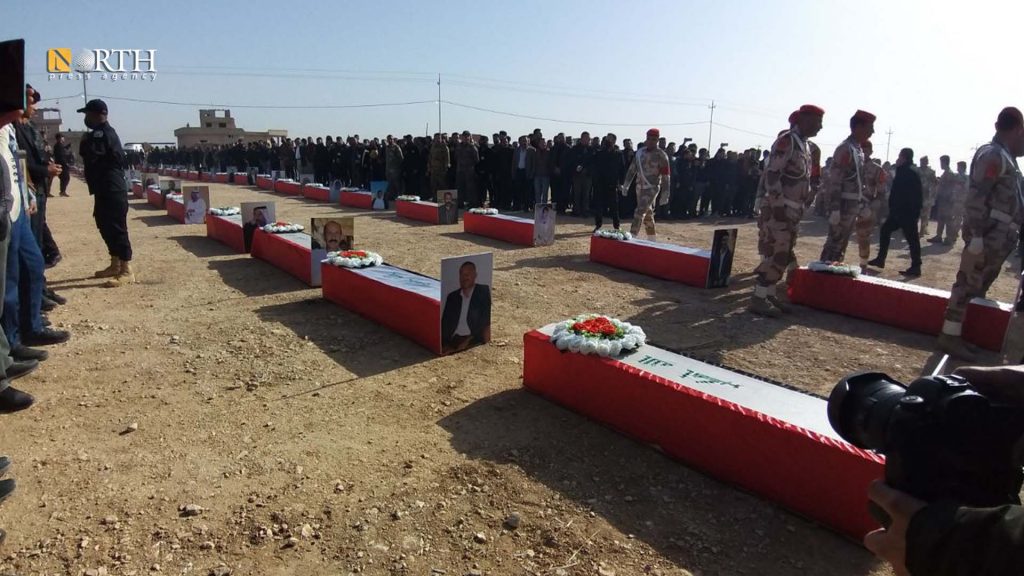QAMISHLI, Syria (North Press) — A 278-page investigative report published by a group of British human rights lawyers showcased how Turkey facilitated the Yezidi genocide in Iraq in 2013, clarifying that Turkey should stand trial in front of the international court.
The report, which The Guardian publicized, is seeking to demonstrate that states bear the responsibility to prevent genocide on their territories, even if they are carried out by a third party such as Islamic State Organization (ISIS) in the case of the Yezidi genocide.
In August 2014, the Islamic State attacked Shengal, the homeland of the Yezidi ethnoreligious minority, killing thousands, abducting tens of thousands, and displacing nearly half a million.
According to a new statistic published by the Office for the Rescue of Yezidi Kidnapped, based in the Kurdistan Region of Iraq, the number of displaced Yezidis at the hand of ISIS reached about 360,000, of whom 150,000 people returned to Shingal.
The office documented the kidnapping of 6,417 Yezidis in the events of August 2014, the fate of 2,763 of them is still unknown.
The lawyers, gathered under the name of the Yezidi Justice Committee (YJC), said that according to the Genocide Convention, states should be held accountable under international law if they did not prevent the crime of genocide.
Sir Geoffrey Nice QC, chair of the YJC, described the genocide of the Yezidi people as “madness heaped on evil.”
“Mechanisms in place could have saved the Yezidis from what is now part of their past, and part of their past partial destruction,” he said.
82 mass graves were found in Shingal (Sinjar) district alone, in addition to dozens of sites containing individual graves of victims killed at the hands of ISIS. Also, 68 religious shrines were destroyed, according to Office for the Rescue of Yezidi Kidnapped.
The report, which followed a three-year inquiry that investigated the conduct of 13 countries, concluded three of them failed in their duty to take reasonable steps to prevent the genocide. They are Turkey, Iraq and Syria.
According to the report, which is endorsed by British human rights lawyer Helena Kennedy, the Syrian government failed to prevent the transfer and detention of enslaved Yezidis on its soil.
Regarding Iraq, the report said that by June 2014, Iraq had called on the UN to recognize the massacres committed by ISIS, but it (report) accused the Iraqi government of not coordinating with Kurdish authorities or taking action to evacuate the Yezidis to safety.
The Yezidi religion is an independent religion and not a doctrine or sect of another religion. It also has its own culture and beliefs in God, angels, prophets, messengers, and the creation of the universe, according to Yezidi clerics.
In the case of Turkey, the committee went further by accusing its leaders of being complicit in the atrocities, claiming that it failed to guard its borders to stop the free flow of ISIS militants, with Turkish nationals comprising a huge portion of them.
The report alleged that from April 2014, Turkish authorities overlooked the sale, transfer and enslavement of Yezidi women and children.
Turkey also helped, according to the committee, train ISIS militants to fight its Kurdish enemies in Syria and, thus, nourishing the perpetrators of the genocide.
The Turkish ambassador to the UK, Umit Yalcin, described the criticisms as baseless and unfair, claiming that Turkey “played a key role in the protection of Syrian civilians and minorities, including Yezidis.”
British human rights lawyer Helena Kennedy, one of the participants in the investigation, said in her joint foreword with Lord David Alton, “States had failed to in their duty to address their responsibilities to prevent the [Yezidi] genocide for a variety of inhumane reasons”. If they are not held accountable, she wrote, “then the promise of ‘never again’ rings hollow.”

